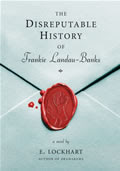books read: 3
 Disreputable History of Frankie Landau-Banks (E. Lockhart)
Disreputable History of Frankie Landau-Banks (E. Lockhart)This young adult novel is a contender in the 2009 Tournament of Books, which is how it landed on my radar. Frankie Landau-Banks is a legacy at a fancy boarding school. She’s blossomed into a swan over the summer and, starting her sophomore year, has caught the eye of a senior boy, Matthew Livingston. Matthew is the head of a secret society, the Loyal Order of the Basset Hounds, which Frankie discovers after following him one evening. Despising Matthew deceptions, and inspired by what she is learning in a class that explores the roots of social and political protest, Frankie decides to engage in her own form of street theater. The novel was quick to read, full of chest-thumping girl power. In the first round of the ToB, Frankie Landau-Banks faces Peter Matthiessen’s National Book Award-winning masterwork, Shadow Country.
Death and Judgment (Donna Leon)
This is the fourth mystery in the series featuring Commissario Brunetti, who unravels a prostitution ring with the most unlikely of leaders. For my money, this episode had a slow but dramatic start and, sadly, little of the luscious descriptions of food and Venice that are such a draw. But, to date, the ending has left the strongest impression. I’m looking forward to number five, Acqua Alta, which I’ve started twice before and which features a return of the opera star from Death at La Fenice.
House (Michael Ruhlman)

I am a huge fan of Ruhlman, especially Soul of a Chef and The Reach of a Chef, but he’s also a wicked blogger. In House, Ruhlman writes about buying and restoring a 100-year-old home in Cleveland, his hometown. It’s a frank and inspiring memoir, as well as a love letter to Cleveland. Beyond that Ruhlman explores the structure of a house and what makes a house a home. Here’s the author’s lovely, evocative prose, before the renovation begins:
I descended the stairs slowly, held the banister as I hit the landing. I could imagine the tread of girls my daughter’s age on these stairs. I continued to the main hallway. I would stroll this way through the quiet house over the next several days, trying to imagine what had happened here—it was such an old house—and also what might happen.books heard: 2
 Netherland (Joseph O’Neill)
Netherland (Joseph O’Neill)Netherland has been on my TBR list since it was published in 2008. It received strong reviews and was a New York Times Notable. The unabridged audio gave me an opportunity to “read” the book in time for the 2009 Tournament of Books, in which Netherland is a contender. The novel follows Hans van den Broek, a Dutch banker living in the Chelsea Hotel after his British wife, following 9/11, hightails it back to London with their son. In navigating his new life, Hans makes the acquaintance of Chuck Ramkissoon, a Gatsby-esque schemer, and falls into the cricket subculture. It was a quiet novel, perfectly enjoyed in audio form.
Me Talk Pretty One Day (David Sedaris)

It’s all well and good to read any of Sedaris’s bestselling essay collections—and it’s quite another to listen to him on audio. His voice is so distinctive that you will hear it in your head as you read his essays, but I believe you will laugh a little harder and more often if you hear him perform. Me Talk Pretty One Day kicks off with an essay about the speech therapy he endured as a child to correct his lisp but the bulk of this collection is about moving to France and the oddities of culture and language. And the pieces are outrageously funny and smart. I wanted to hang on every word so that I could repeat passages back to friends later, but my memory sucks.
books bought: 5
The self-imposed ban on buying books is officially off. It was an unrealistic expectation, which I knew from the moment I committed the pledge to cyberspace. For awhile, I deluded myself into believing it was possible to hold my consumer tendancies in check. Later, I rationalized buying one book a month, so that I may continue to support independent booksellers. Then an unfortunate mental state presented itself. Only retail therapy would do. The first place I turned was the bookstore. You can see how slippery the slope is.
Fiction on a Stick (edited by Daniel Slager)
This anthology had a lot of local buzz when it was released, but these six-question interviews with some of the authors placed it more squarely on my radar.
A Place of My Own (Michael Pollan)
Before Pollan became a household name with Omnivore’s Dilemma, he wrote a memoir about building a writing studio. On the heels of Michael Ruhlman’s House, this book falls neatly in line with my interest in architecture.
no one belongs here more than you (Miranda July)
Total impulse purchase based on a desire to read more short fiction.
Oranges (John McPhee)
I have intended to read McPhee for a very long time. Following a visit from my mother-in-law and her husband, who can fit a McPhee book into almost any conversation, I ran across this mostly botanical microhistory at Sixth Chamber. Kismet.
The Borrowers (Mary Norton)
Also at Sixth Chamber, I found this classic children’s novel of tiny people who live in the walls of bigger people’s homes. I had been looking for something with a little more substance to read aloud to the boys, and this book from my childhood seems a good choice. To this day, I love found objects and often try to imagine what the Borrowers would do with an empty shotgun shell.
books abandoned: 2
Nemesis
Discovery of France
No comments:
Post a Comment